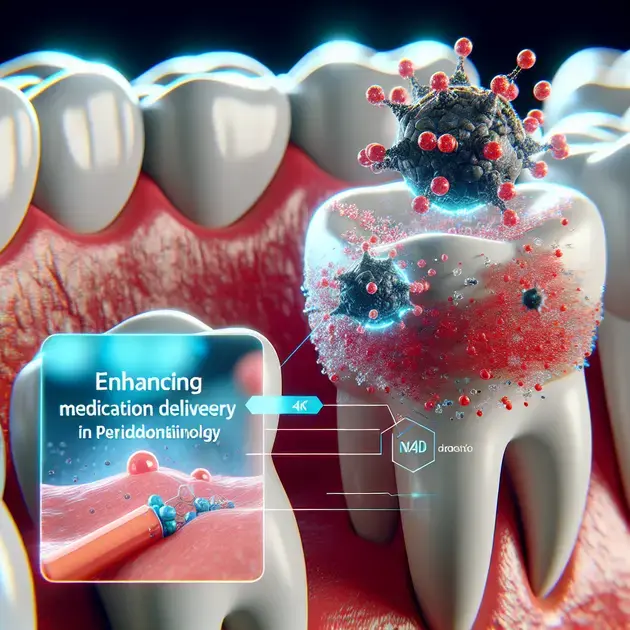When it comes to addressing the treatment of periodontitis, finding effective medication options is crucial for managing this chronic inflammatory condition. Periodontitis, a severe form of gum disease, can lead to tooth loss and has been linked to various systemic health issues.
Recent advancements in dental research have highlighted promising medication options that can help combat periodontitis and improve oral health outcomes. Patients now have access to innovative pharmaceutical solutions that target the underlying causes of the disease, offering new hope for effective treatment.

Innovative Medication Solutions for Periodontitis
Periodontitis is a common inflammatory condition that affects the gums and bone supporting the teeth. It is caused by bacteria found in dental plaque which leads to gum inflammation and, if left untreated, can result in tooth loss. Traditional treatments for periodontitis include professional cleanings, scaling and root planing, and in severe cases, surgery. However, innovative medication solutions are emerging as promising new approaches to target the underlying causes of periodontitis.
Exploring Biofilm-Disrupting Agents
One innovative medication solution for periodontitis involves biofilm-disrupting agents that target the bacterial colonies responsible for gum inflammation. These agents work by breaking down the protective barrier of the biofilm, making the bacteria more susceptible to traditional treatments like antibiotics. Apps like Dental Drug Reference provide information on the latest biofilm-disrupting medications and where to access them.
Utilizing Host-Modulation Therapy
Another approach to innovative medication solutions for periodontitis is host-modulation therapy, which aims to modify the body’s response to bacterial infection. These medications can help regulate the inflammatory response in the gums and promote tissue healing. Websites like Perio.org offer resources on host-modulation therapy options and how they can complement traditional periodontal treatments.
Targeting the Underlying Causes of Periodontitis
While traditional periodontal treatments focus on managing the symptoms of periodontitis, targeting the underlying causes of the condition is essential for long-term success. By addressing factors like bacterial overgrowth, genetic predisposition, and systemic health conditions, innovative medication solutions can help prevent the progression of periodontitis.
Addressing Genetic Risk Factors
Genetic testing for periodontitis risk factors can help identify individuals who are predisposed to the condition. Innovative pharmacogenomic approaches are being developed to provide personalized medication options based on an individual’s genetic profile. Apps like MyHeritage DNA offer genetic testing services that can uncover potential risk factors for periodontitis.
Managing Systemic Health Conditions
Systemic health conditions like diabetes and cardiovascular disease can exacerbate periodontitis. Innovative pharmaceutical options that target these comorbidities can help improve overall oral health. Websites like Diabetes.org provide information on the latest medications for managing diabetes and their potential impact on periodontitis.
Promising Pharmaceutical Options for Managing Periodontitis
Advancements in pharmaceutical research are leading to promising new options for managing periodontitis and improving patient outcomes. By combining traditional periodontal treatments with innovative medications, healthcare providers can offer comprehensive care that addresses both the symptoms and causes of the condition.
Integrating Antibiotic Therapies
Antibiotics are commonly used in the treatment of periodontitis to target the specific bacteria causing the infection. Innovative antibiotic therapies, such as localized drug delivery systems, can deliver medication directly to the affected areas for improved efficacy. Apps like Epocrates provide dosing guidelines and information on the latest antibiotic options for periodontitis.
Exploring Anti-Inflammatory Agents
Inflammation plays a key role in the progression of periodontitis, making anti-inflammatory agents a valuable addition to treatment regimens. Innovative pharmaceutical options that target inflammatory pathways can help reduce gum swelling and promote tissue healing. Websites like Arthritis.org offer insights into anti-inflammatory medications that may benefit individuals with periodontitis.

Promising Approaches for Periodontitis Medication Management
When it comes to managing periodontitis with medication, a promising approach is to focus on personalized treatment plans tailored to each patient’s specific needs. By analyzing factors such as the severity of the condition, the patient’s medical history, and their response to previous treatments, healthcare providers can develop more effective and targeted medication strategies. This personalized approach can lead to better outcomes and improved overall oral health for individuals struggling with periodontitis.
One key aspect of effective medication management for periodontitis is the use of antimicrobial agents to target and eliminate the bacteria causing the infection. By incorporating antibiotics or antiseptics into the treatment plan, healthcare providers can directly address the underlying cause of periodontitis and reduce inflammation in the gums. This targeted approach can help prevent the progression of the disease and support the long-term health of the gums and supporting structures.
In addition to antimicrobial agents, another promising approach for periodontitis medication management is the use of anti-inflammatory medications to reduce swelling and discomfort associated with the condition. By controlling inflammation in the gums, these medications can help alleviate symptoms such as bleeding, sensitivity, and pain, making it easier for individuals to maintain good oral hygiene practices and prevent further damage to their gums.
Furthermore, the development of novel drug delivery systems, such as gels, mouth rinses, or subgingival chips, can enhance the effectiveness of periodontitis medication management. These innovative strategies allow for targeted and sustained release of medications directly to the affected areas, maximizing their therapeutic benefits and minimizing side effects. By incorporating these advanced delivery systems into treatment plans, healthcare providers can optimize the outcomes of medication management for periodontitis.
Overall, by embracing personalized treatment plans, utilizing antimicrobial and anti-inflammatory agents, and leveraging innovative drug delivery systems, promising approaches for periodontitis medication management can significantly improve the quality of care for individuals with this common dental condition.
Optimizing Treatment Outcomes Through Personalized Medication Plans
When aiming to optimize treatment outcomes for periodontitis, personalized medication plans can play a crucial role in tailoring interventions to the specific needs of each patient. By considering factors such as the patient’s overall health, medication history, and response to previous treatments, healthcare providers can develop customized plans that address the root causes of periodontitis and support long-term oral health.
One key strategy for optimizing treatment outcomes through personalized medication plans is the use of combination therapies that target multiple aspects of the disease simultaneously. By combining antimicrobial agents, anti-inflammatory medications, and supportive therapies such as probiotics or growth factors, healthcare providers can create comprehensive treatment plans that address the complex nature of periodontitis and promote healing and tissue regeneration.
Another important aspect of personalized medication plans is the consideration of individual risk factors and comorbidities that may impact the progression of periodontitis. By taking into account factors such as smoking, diabetes, or genetic predispositions, healthcare providers can develop targeted interventions that address these specific concerns and improve the overall effectiveness of treatment.
Furthermore, by actively involving patients in the development and implementation of their medication plans, healthcare providers can enhance treatment adherence and encourage positive oral health behaviors. By providing education, support, and regular monitoring, patients can feel empowered to take control of their oral health and actively participate in their treatment, leading to more successful outcomes in the long run.
Overall, through the use of personalized medication plans that incorporate combination therapies, consider individual risk factors, and involve patients in their care, treatment outcomes for periodontitis can be optimized, leading to improved oral health and quality of life for individuals affected by this chronic condition.
Innovative Strategies for Enhanced Periodontitis Medication Delivery
When exploring innovative strategies for enhanced medication delivery in the management of periodontitis, healthcare providers can leverage advanced techniques and technologies to improve the efficacy and efficiency of treatments. By enhancing the delivery of medications directly to the affected areas in the oral cavity, these innovative strategies can maximize therapeutic benefits and minimize potential side effects, ultimately leading to better outcomes for patients.
One innovative approach for enhanced periodontitis medication delivery is the use of localized drug delivery systems, such as periodontal gels or medicated mouth rinses, that can target specific areas of infection and inflammation in the gums. These localized systems allow for sustained release of medications over time, ensuring continuous treatment and better penetration into hard-to-reach areas, leading to improved outcomes for patients with periodontitis.
Additionally, advancements in nanotechnology have opened up new possibilities for enhancing medication delivery in periodontal therapy. By utilizing nanoscale drug carriers or nanoparticles, healthcare providers can improve the bioavailability and targeting of medications, increasing their effectiveness in combating periodontitis and promoting tissue regeneration. These innovative nanotechnologies hold great promise for revolutionizing the treatment of periodontitis and improving patient outcomes.
Moreover, the development of customized drug delivery devices, such as bioadhesive patches or biodegradable implants, offers unique solutions for targeted medication delivery in periodontal care. These devices can be tailored to the individual needs of each patient, providing precise dosing and controlled release of medications, while also enhancing patient comfort and compliance with treatment regimens.
Overall, by embracing innovative strategies for enhanced medication delivery in the management of periodontitis, healthcare providers can optimize treatment outcomes, improve patient experiences, and advance the field of periodontal therapy to new heights of efficacy and precision.
Conclusion
In conclusion, the management of periodontitis through personalized medication plans offers a promising approach for individuals suffering from this common dental condition. By tailoring treatment strategies to each patient’s specific needs, healthcare providers can enhance the effectiveness of medication management and improve overall oral health outcomes. Incorporating antimicrobial agents and anti-inflammatory medications in personalized plans helps target the root causes of periodontitis, reduce inflammation, and prevent disease progression, ultimately supporting long-term gum health.
Optimizing treatment outcomes through personalized medication plans involves the strategic use of combination therapies to address the complex nature of periodontitis holistically. Considering individual risk factors and comorbidities allows healthcare providers to develop targeted interventions that enhance treatment effectiveness. Moreover, involving patients in their care promotes treatment adherence, encourages positive oral health behaviors, and empowers individuals to actively participate in their oral health journey, leading to more successful treatment outcomes in the long term.
Furthermore, innovative strategies for enhanced medication delivery in periodontitis management, such as localized drug delivery systems and advancements in nanotechnology, hold great promise for revolutionizing treatment efficacy and precision. These advanced techniques maximize therapeutic benefits while minimizing side effects, ultimately improving patient experiences and advancing the field of periodontal therapy. By embracing personalized medication plans and innovative delivery systems, healthcare providers can optimize treatment outcomes, enhance patient quality of life, and pave the way for more effective management of periodontitis in the future.



